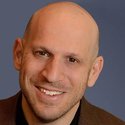17
May 2018
Listening to the Bible
Or Mars
My doctor says I should limit my news consumption as it is detrimental to my well-being. Well, he didn’t actually say that, but my brain was screaming at me after my morning and evening commutes to and from my office. I was listening to the radio every day, but I was none the wiser for it. In fact, my soul was diminished by the political nastiness that I was letting live inside my head rent-free.
So, I decided to read only the newspaper. At the same time, I set out on a more nourishing endeavor: challenging myself to read at least 100 books in 2018 — many of which came in the form of audiobooks that blessedly replaced the radio news cycle. I’m hitting the Pulitzers, Man Bookers, Nobels, Israeli novels, and anything friends recommend or that my children are reading. (I’ll post the full list with links on my Facebook page when I hit my goal. I’m on #54).
And, I have listened to the entire JPS translation of the Tanakh, which I am counting as one book. Yes, that is correct, in the span of 10 days I listened to every story of family intrigue, every begatting, smiting, warring, loving, knowing and every shalt and shalt not. Every prediction of doom and vision of redemption from Genesis to Chronicles II was mellifluously read aloud by 14 actors. The Torah itself was read alternating parshiot between a man and a woman. (Nice touch JPS!) Each read the Holy Scripture with emotional inflections, but not the voicing of characters. I assume that is because God’s voice would be impossible to vocalize (in spite of past Hollywood attempts).
The experience of heavy duty reading is changing me. By listening to other people’s narratives for hours each day, I learn to pay attention to my own narrative. My goal is to become more mindful of the anticipated next line of my life’s story even before it happens. That way, I can interact in the world more purposefully. This is in line with Les Wexner’s idea that all leadership starts with “self-leadership.” Currently, I am reading Paul Auster’s 4321 (highly recommended) in which he writes about being with a certain friend as “an exercise in the art of paying attention, and paying attention…was the first step in learning how to be alive.” Paying attention is also the first step of self-leadership.
For me, reading novels is an exercise in the art of compassion; I lose and then find myself in other people’s narratives by seeing the world through their eyes, feeling their feelings and celebrating and lamenting their choices. Paying attention to other people’s narratives, fictional or not, leads one towards compassion. And, without compassion, there is no leadership.
In hearing the narratives in the Tanakh read continuously from beginning to end, I experienced in a new way the holy nature of the texts that were already a part of me. I honed my awareness of the world and compassion for others through Moses, Jonah, Deborah, Miriam, Samuel and Jeremiah. My favorite narratives were those of Joseph and David, unfolding over many chapters and revealing flawed but beautiful human beings whom I came to love in a personal way.
And then there were the surprise little gems that showed up in the books that I never would have read straight through were it not for the audiobook version. For example, Joshua chapter 22 tells the story of how, after the conquest of Canaan, 2½ tribes are sent to their lands on the other side of the Jordan. In a New York minute Reuben, Gad and half of Menasseh have built an altar of their own. When word gets back to the rest of Israel, it is determined that they should be destroyed for turning to other gods.
Mindfulness teacher Jon Kabat Zinn writes that “sometimes just stopping is an act of sanity of love,” and this is exactly what happens at this point in the story. Pinchas, son of Elazar, the same zealous vigilante who publicly killed a transgressor in a fit of righteous indignation in the Sinai is now the very one exemplifying patience and curiosity. People are complicated, indeed. He asks the tribal leaders “What’s the deal with the altar?” and they answer that they didn’t want the rest of Israel to think that their geographic distance from the community made them spiritually distant from God. That answer clears up the matter and they are spared. Curiosity and patience save the day.
There are many ways to develop our innate leadership qualities — mentoring and coaching, case consultations, cohort-based learning, reading leadership books and reading novels. Just because novels are fiction, by definition, doesn’t mean they aren’t true. And the experience of listening to the Tanakh (regardless of whether you consider it a novel or non-fiction) and the narratives and lessons within can make us better leaders through understanding its characters’ narratives leading us towards deepened awareness, compassion and curiosity.

Get To Know The Author
Or Mars is Vice President of The Wexner Foundation and a member of WGF/DS Class 6. In his spare time, he can be found driving and listening to a book, exercising and listening to a book, doing dishes and listening to a book, drinking coffee and listening to a book, you get the idea. PLEASE SEND HIM RECOMMENDATIONS FOR YOUR FAVORITE BOOKS!
